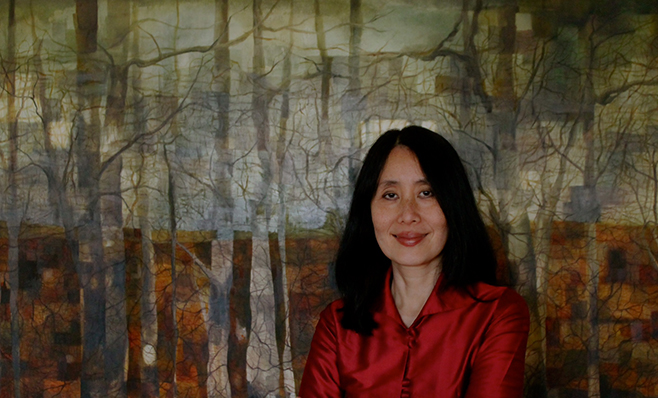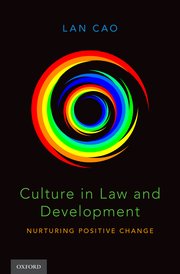
Fowler Law Professor Lan Cao Publishes New Book on Law & Development
March 21, 2016

Chapman University Dale E. Fowler School of Law Professor Lan Cao’s newest book
Culture in Law & Development: Nurturing Positive Change
, which examines conventional law and development projects funded by institutions ranging from the World Bank to the U.S. Agency for International Development, will be released this spring by Oxford University Press.
The book explores why projects that have exported property, commercial, contract, corporations and other laws to developing countries have failed and argues that engaging with local cultural norms should be an integral part of the law and development endeavor. Background cultural norms affect whether a law will be supported. For example, international human rights laws, especially those that promote women’s rights, may face entrenched opposition from some on cultural grounds. This book draws on foundational principles of a variety of scholarly disciplines related to law and development – public international law, international relations, international human rights and private international law – to demonstrate that although culture has been historically sidelined by those disciplines, law and development should actively integrate universal norms into the law and development agenda. More precisely and more controversially, the book also proposes that law and development projects work to change cultural norms that are in opposition to development objectives.
From pre-release reviews:
Culture in Law & Development: Nurturing Positive Change is a pioneering book that systematically shows how culture has been neglected – at significant cost – in a range of separate but interrelated fields, from public international law to international human rights to international relations to law and development. Almost everyone acknowledges that ‘culture is important.’ But few scholars are willing to engage the thorny issues raised by culture – what should we do, for example, when local cultures are antithetical to international development norms? In this fascinating and provocative book, Professor Lan Cao takes on that challenge, arguing that culture can be changed, should be changed, and has been changed before.
– Amy Chua, Yale Law School, Professor of Law
Lan Cao has a rare gift – in her luminous debut as a writer she sketched the experience of exile, what it meant to be a young woman forced to leave Vietnam during the war. Her first two works – Monkey Bridge (Penguin Books 1997) and The Lotus and the Storm (Viking Press 2014) – captured the dysplasia that attends anyone who must start over – the difficulty of reconstructing a sense of place and belonging, regaining courage within the frailty of life.
Her current work translates this wisdom into a different milieu – as guidance to policymakers seeking to assist post-conflict societies and jumpstart economic development. Lan Cao persuasively argues that this cannot be done without taking account of culture and trauma – engaging a society with sympathy and internal understanding, while conceding how hard it is for an outsider to facilitate change. Informal institutions and social practice will matter as much as rules and law. The current chaos in the world instructs that there is no end to history – and that a sense of poetry may be necessary to intervene effectively in mitigating the hardship of the poor.
– Ruth Wedgwood, Edward Burling Professor of International Law and Diplomacy, Johns Hopkins School of Advanced International Studies, Washington, D.C.; and former U.S. member, United Nations Human Rights Committee
This path-breaking book examines the necessity of engaging forthrightly with cultural questions if rule of law building efforts are to be sustainable and effective. With insight and sensitivity, [Professor Cao] explores both the challenges and opportunities of addressing culture directly. How, for example, can tensions between international standards and local practices be addressed? How can opportunities for creative engagement and empowerment of marginalized voices be nurtured? Highlighting the often fluid nature of cultural traditions and debates, [the author] offers innovative approaches that will be of broad interest to rule of law practitioners, scholars, policy makers and advocates on the ground.
– Jane Stromseth, Professor of Law, Georgetown University
Professor Lan Cao
is the Betty Hutton Williams Professor of International Economic Law. She joined the Fowler School of Law faculty in 2013 after serving for more than a decade on the faculty at William & Mary Law School, where she was the Boyd Fellow and Professor of Law. She clerked for Judge Constance Baker Motley of the U.S. District Court for the Southern District of New York. She practiced with Paul, Weiss, Rifkind, Wharton and Garrison in New York City. Professor Cao was a Ford Foundation Scholar in 1991. She has published scholarly articles in the area of international trade and finance, international economic development, finance and culture in law. She is also the author and co-author of several books and supplements, including
The Lotus and The Storm
(Viking Press 2014) and the novel
Monkey Bridge
(Penguin 1997), about the Vietnamese War and its impact on a young Vietnamese American girl.

